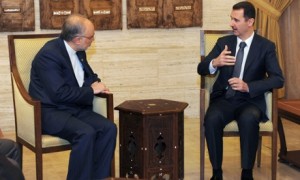 There are no clear indications of a change in�Iran�s position�on the Syrian developments. The position is based on the vision of Supreme Leader of Iran Ali Khamenei on the need to support the Syrian government. This, however, did not prevent the concerned circles from examining the available opportunities necessary to absorb any sudden developments in the Syrian situation.
There are no clear indications of a change in�Iran�s position�on the Syrian developments. The position is based on the vision of Supreme Leader of Iran Ali Khamenei on the need to support the Syrian government. This, however, did not prevent the concerned circles from examining the available opportunities necessary to absorb any sudden developments in the Syrian situation.It is believed that Tehran does not deal with the Syrian affair through one channel, which is the Syrian government. Although it supports President Bashar al-Assad due to his regime�s positions on Iran over the past three decades, it is also trying to preserve its regional interests in the post-Assad stage.
While Commander of Iran's Revolutionary Guard Gen.�Mohammad Ali Jafari�announced that his forces are providing technical support to the Syrian government, political circles are assessing the effects of the current developments, and the possibility of Iran playing the role of mediator to end the crisis with the least possible cost.
The Iranian leadership believes that the future situation in Syria will determine the future of the region and shape the political map in it.
Sources believe that Iran, under the current circumstances, is seeking to reach a kind of balance based on increasing cooperation with regional countries, in order to forge a regional alliance and accommodate the threats facing the �resistance line� through coordination with the Muslim Brotherhood current. But these moves are colliding with the sectarian wave sweeping the region, which is preventing it from fulfilling its regional vision regarding national security.
Although some Iranian sides have ruled out the possibility of Iran playing a mediating role in the Syrian crisis after the recent developments, the government still insists on its position. This is especially true since it is coordinating with the Russian side, which is still counting on the possibility of the Syrian government overcoming the events and developments, until the U.S. position becomes clearer after President Barack Obama assumes his official duties for a second term on Jan. 20.
Former Deputy Foreign Minister Mohammad Sadr boldly called on the Iranian government to make the best choice that would preserve Iranian interests, and to prepare for the post-Assad stage.
Sadr�s call coincided with statements by Chairman of the Expediency Discernment Council of the System Hashemi Rafsanjani, who predicted the inevitable fall of the Assad regime. However, his view might not be consistent with the government's position, or at least with the declared position of Iranian officials.
Chief of Staff of the Iranian Armed Forces Maj. Gen. Hassan Firuzabadi said on Dec. 27 that he has accurate information concerning the situation on the ground�in Syria. He added that �the Syrian army and popular forces control all areas, despite the problems caused by the cooperation between the terrorists and regional countries, the United States and Israel.�
Tehran believes that the fall of the Syrian regime would be a big blow for the �resistance line,� the backbone of Iranian strategy.
Iranian Foreign Ministry spokesman Ramin Mehmanparast sums up the current situation, and says: �If we manage to handle the current situation well, a bright future would await the Muslim world. If these arrogant groups � God forbid � succeed in implementing their conspiracies, it would deal a strong blow to the Islamic current.�
This clearly implies that Tehran seeks to thwart any steps aimed at overthrowing the Syrian government through armed action, and is trying to focus on the �transitional period� that would maintain the unity of the Syrian army, which considers Iran as one of the mechanisms of the �resistance line� in the region.
It appears that Tehran has succeeded in persuading the Iraqi government to take a tough stance against the�Syrian armed groups, which seek the �Somalization of Syria.� This, in turn, does not serve security in Iraq, which has previously suffered from the armed groups. It also does not serve regional security, which affects Lebanon and Palestine.
By Al-Monitor
The Iran Project is not responsible for the content of quoted articles.










